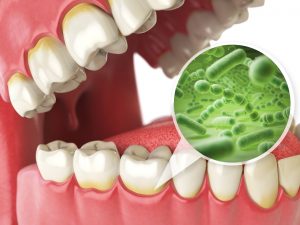 If you’ve recently been diagnosed with sleep apnea, your physician discussed the risks of not treating the condition, like heart disease, sleep deprivation, and depression; however, those aren’t the only dangers. According to a study published by the Sleep Research Society, sleep apnea can increase your risk of gum disease, which is linked to tooth loss and several health concerns. Although sleep apnea and gum disease are two very different conditions, here’s what you need to know about their connection to keep your mouth and body healthy.
If you’ve recently been diagnosed with sleep apnea, your physician discussed the risks of not treating the condition, like heart disease, sleep deprivation, and depression; however, those aren’t the only dangers. According to a study published by the Sleep Research Society, sleep apnea can increase your risk of gum disease, which is linked to tooth loss and several health concerns. Although sleep apnea and gum disease are two very different conditions, here’s what you need to know about their connection to keep your mouth and body healthy.
Sleep Apnea VS Gum Disease
Obstructive sleep apnea (OSA) is the most common form of the breathing-related condition. An obstruction created by the tongue or soft tissues in the back of the mouth causes frequent disruptions in breathing while sleeping. Each interruption depletes the body of oxygen, causing you to be jolted awake to resume normal breathing. This disturbs your sleep cycle, which can cause daytime fatigue and sleep deprivation. Over time, the strain on your body can lead to various health issues, like cardiovascular disease, diabetic complications, and memory loss.
Gum disease is quite different from sleep apnea. The infection is caused by bacteria in plaque and tartar buildup, which affects 50% of Americans. Initially, symptoms of gum disease appear as red, swollen, and bleeding gums. With no treatment, the infection can destroy the supporting structures of your teeth, causing them to loosen and fall out. However, bacteria from gum disease can also enter the bloodstream, increasing your risk of heart disease, Alzheimer’s disease, respiratory illnesses, and much more.
What’s the Connection?
Untreated sleep apnea can lead to mouth breathing, which causes it to dry out. If your mouth isn’t moist, it creates the perfect breeding ground for harmful bacteria that contribute to gum disease. Not to mention, sleep apnea sufferers can also have poor oral hygiene habits from ongoing fatigue. If you’re not feeling well-rested, you may be less likely to brush and floss. You may also consume more sugary foods and drinks to stay awake. Both factors can contribute to gum disease.
Sleep Better and Keep Your Gums Healthy
If you have sleep apnea, don’t spend another night tossing and turning. You have multiple options to breathe better, like:
- CPAP: A CPAP delivers a gentle stream of air pressure through a mask worn over the nose to prevent pauses in breathing.
- Oral Appliance: A custom-fit device holds the tongue and jaw in a more comfortable position to prevent an obstruction in the airway.
With the right sleep apnea treatment and a good oral hygiene routine at home, you can support a healthy mouth and body while getting the rest you need to feel your best.
About Dr. Bernard L. Greenbaum
Dr. Greenbaum earned his dental degree at the Georgetown University School of Dentistry and has completed advanced education in many specialties, like general dentistry, dental sleep medicine, and snoring treatment. If you have sleep apnea, contact our office today to see if an oral appliance is right for you.
